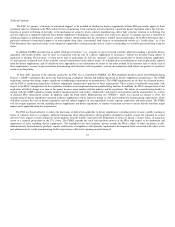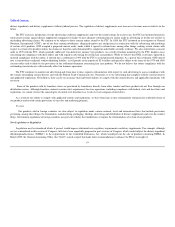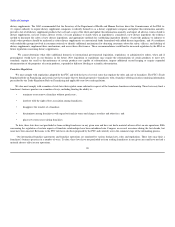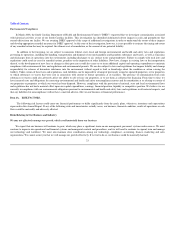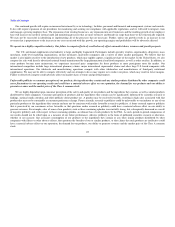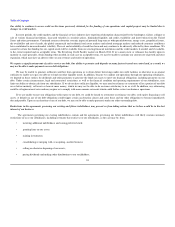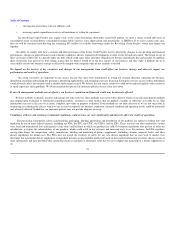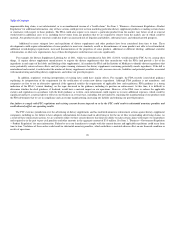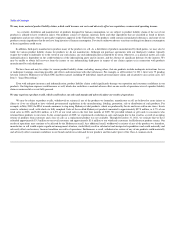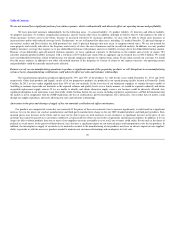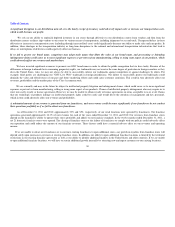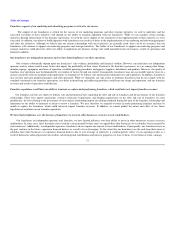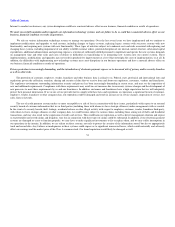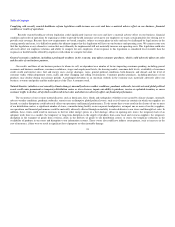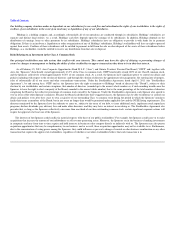GNC 2012 Annual Report Download - page 29
Download and view the complete annual report
Please find page 29 of the 2012 GNC annual report below. You can navigate through the pages in the report by either clicking on the pages listed below, or by using the keyword search tool below to find specific information within the annual report.
Table of Contents
We may incur material product liability claims, which could increase our costs and adversely affect our reputation, revenues and operating income.
As a retailer, distributor and manufacturer of products designed for human consumption, we are subject to product liability claims if the use of our
products is alleged to have resulted in injury. Our products consist of vitamins, minerals, herbs and other ingredients that are classified as foods or dietary
supplements and are not subject to pre-market regulatory approval in the United States. Our products could contain contaminated substances, and some of our
products contain ingredients that do not have long histories of human consumption. Previously unknown adverse reactions resulting from human consumption
of these ingredients could occur.
In addition, third-party manufacturers produce many of the products we sell. As a distributor of products manufactured by third parties, we may also be
liable for various product liability claims for products we do not manufacture. Although our purchase agreements with our third-party vendors typically
require the vendor to indemnify us to the extent of any such claims, any such indemnification is limited by its terms. Moreover, as a practical matter, any such
indemnification is dependent on the creditworthiness of the indemnifying party and its insurer, and the absence of significant defenses by the insurers. We
may be unable to obtain full recovery from the insurer or any indemnifying third-party in respect of any claims against us in connection with products
manufactured by such third-party.
We have been and may be subject to various product liability claims, including, among others, that our products include inadequate instructions for use
or inadequate warnings concerning possible side effects and interactions with other substances. For example, as of December 31, 2011, there were 75 pending
lawsuits related to Hydroxycut in which GNC had been named, including 69 individual, largely personal injury claims and six putative class action cases. See
Item 3, "Legal Proceedings."
Even with adequate insurance and indemnification, product liability claims could significantly damage our reputation and consumer confidence in our
products. Our litigation expenses could increase as well, which also could have a material adverse effect on our results of operations even if a product liability
claim is unsuccessful or is not fully pursued.
We may experience product recalls, which could reduce our sales and margin and adversely affect our results of operations.
We may be subject to product recalls, withdrawals or seizures if any of the products we formulate, manufacture or sell are believed to cause injury or
illness or if we are alleged to have violated governmental regulations in the manufacturing, labeling, promotion, sale or distribution of such products. For
example, in May 2009, the FDA warned consumers to stop using Hydroxycut diet products, which are produced by Iovate and were sold in our stores. Iovate
issued a voluntary recall, with which we fully complied. Sales of the recalled Hydroxycut products amounted to approximately $57.8 million, or 4.7% of our
retail sales in 2008, and $18.8 million, or 4.2% of our retail sales in the first four months of 2009. We provided refunds or gift cards to consumers who
returned these products to our stores. In the second quarter of 2009, we experienced a reduction in sales and margin due to this recall as a result of accepting
returns of products from customers and a loss of sales as a replacement product was not available. Through December 31, 2011, we estimate that we have
refunded approximately $3.5 million to our retail customers and approximately $1.6 million to our wholesale customers for Hydroxycut product returns. Our
results of operations may continue to be affected by the Hydroxycut recall. Any additional recall, withdrawal or seizure of any of the products we formulate,
manufacture or sell would require significant management attention, would likely result in substantial and unexpected expenditures and could materially and
adversely affect our business, financial condition or results of operations. Furthermore, a recall, withdrawal or seizure of any of our products could materially
and adversely affect consumer confidence in our brands and decrease demand for our products and the market price of the Class A common stock.
27



